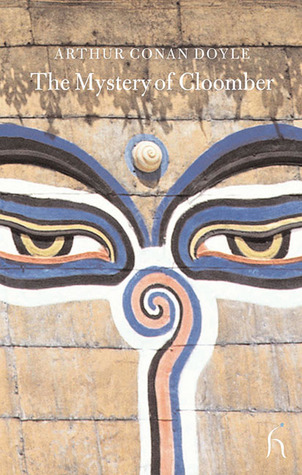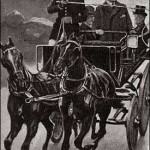Having thrown this side-light upon my narrative, I can now resume the statement of my own personal experiences. These I had brought down, as the reader will doubtless remember, to the date of the arrival of the savage-looking wanderer who called himself Corporal Rufus Smith. This incident occurred about the beginning of the month of October, and I find upon a comparison of dates that Dr. Easterling’s visit to Cloomber preceded it by three weeks or more.

During all this time I was in sore distress of mind, for I had never seen anything either of Gabriel or of her brother since the interview in which the general had discovered the communication which was kept up between us. I had no doubt that some sort of restraint had been placed upon them; and the thought that we had brought trouble on their heads was a bitter one both to my sister and myself.
Our anxiety, however, was considerably mitigated by the receipt, a couple of days after my last talk with the general, of a note from Mordaunt Heatherstone. This was brought us by a little, ragged urchin, the son of one of the fishermen, who informed us that it had been handed to him at the avenue gate by an old woman—who, I expect, must have been the Cloomber cook.
“MY DEAREST FRIENDS,” it ran, “Gabriel and I have grieved to think how concerned you must be at having neither heard from nor seen us. The fact is that we are compelled to remain in the house. And this compulsion is not physical but moral.
“Our poor father, who gets more and more nervous every day, has entreated us to promise him that we will not go out until after the fifth of October, and to allay his fears we have given him the desired pledge. On the other hand, he has promised us that after the fifth—that is, in less than a week—we shall be as free as air to come or go as we please, so we have something to look forward to.
“Gabriel says that she has explained to you that the governor is always a changed man after this particular date, on which his fears reach a crisis. He apparently has more reason than usual this year to anticipate that trouble is brewing for this unfortunate family, for I have never known him to take so many elaborate precautions or appear so thoroughly unnerved. Who would ever think, to see his bent form and his shaking hands, that he is the same man who used some few short years ago to shoot tigers on foot among the jungles of the Terai, and would laugh at the more timid sportsmen who sought the protection of their elephant’s howdah?
“You know that he has the Victoria Cross, which he won in the streets of Delhi, and yet here he is shivering with terror and starting at every noise, in the most peaceful corner of the world. Oh, the pity of it. West! Remember what I have already told you—that it is no fanciful or imaginary peril, but one which we have every reason to suppose to be most real. It is, however, of such a nature that it can neither be averted nor can it profitably be expressed in words. If all goes well, you will see us at Branksome on the sixth.
“With our fondest love to both of you, I am ever, my dear friends, your attached
“MORDAUNT.”
This letter was a great relief to us as letting us know that the brother and sister were under no physical restraint, but our powerlessness and inability even to comprehend what the danger was which threatened those whom we had come to love better than ourselves was little short of maddening.
Fifty times a day we asked ourselves and asked each other from what possible quarter this peril was to be expected, but the more we thought of it the more hopeless did any solution appear.
In vain we combined our experiences and pieced together every word which had fallen from the lips of any inmate of Cloomber which might be supposed to bear directly or indirectly upon the subject.
At last, weary with fruitless speculation, we were fain to try to drive the matter from our thoughts, consoling ourselves with the reflection that in a few more days all restrictions would be removed, and we should be able to learn from our friends’ own lips.
Those few intervening days, however, would, we feared, be dreary, long ones. And so they would have been, had it not been for a new and most unexpected incident, which diverted our minds from our own troubles and gave them something fresh with which to occupy themselves.


